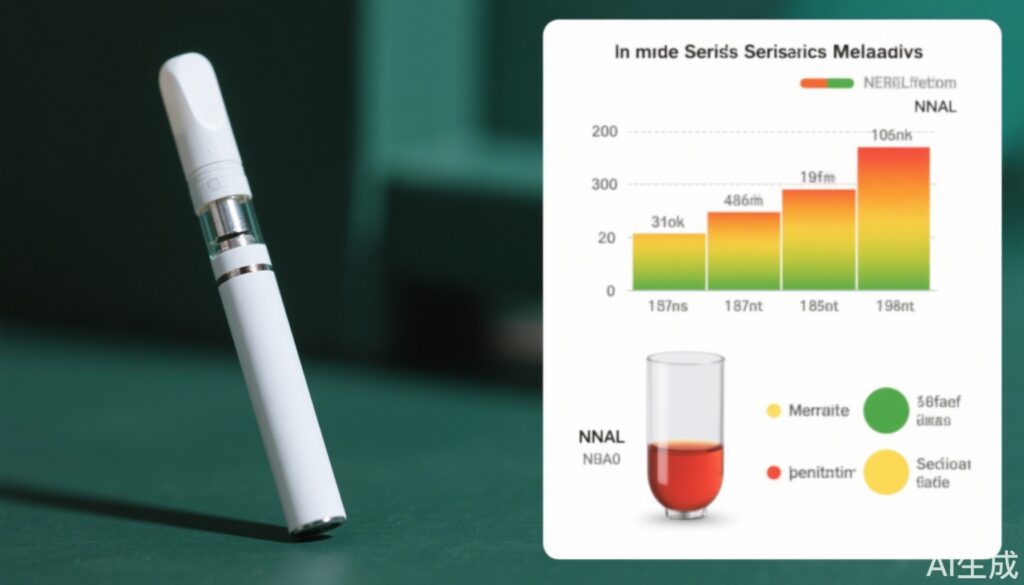Introduction
Smoking prevalence among individuals with serious mental illness (SMI) remains substantially higher than in the general population, accompanied by notably lower quit rates. This disparity contributes to an elevated burden of carcinogenic exposure, chronic disease incidence, and premature mortality in this vulnerable group. Traditional cessation methods have limited success, highlighting the urgent need to explore innovative harm reduction strategies. Electronic nicotine delivery systems (ENDS), such as disposable e-cigarettes, present a promising alternative by potentially reducing exposure to tobacco-related carcinogens. The present randomized controlled trial (RCT) investigates the impact of ENDS provision on carcinogen exposure, assessed via the tobacco-specific nitrosamine metabolite NNAL, among smokers with SMI who are currently unwilling to quit.
Study Background and Disease Burden
People with serious mental illnesses—including schizophrenia and bipolar disorder—experience disproportionately high smoking rates, often exceeding 50%. This contributes directly to an increased risk of cardiovascular disease, respiratory illness, and various cancers, resulting in a mortality gap of up to 20 years compared to the general population. Conventional smoking cessation interventions are hindered by factors such as nicotine dependence, mental health symptoms, and social determinants. Consequently, harm reduction approaches focusing on lowering carcinogen intake without immediate cessation have garnered attention. ENDS could reduce exposure to harmful constituents in tobacco smoke, thereby attenuating the associated health risks.
Study Design
The RCT enrolled 240 participants diagnosed with SMI (47% schizophrenia, 53% bipolar disorder; 55% non-white; 52% male) who smoked cigarettes daily and had attempted but were currently unwilling to quit. Baseline mean breath carbon monoxide (CO) was elevated (26.9 ppm, SD 19.9), indicating substantial recent smoke exposure. Participants were randomized to either receive disposable ENDS provision for 8 weeks or to an assessment-only control arm without ENDS access. Urinary total NNAL—a validated biomarker of tobacco-specific nitrosamine exposure and carcinogen uptake—was measured at baseline, week 4, and week 8. Generalized linear mixed models assessed the longitudinal effects of ENDS use on NNAL levels accounting for repeated measures and group-by-time interaction effects.
Key Findings
At baseline, mean urinary NNAL concentrations did not significantly differ between groups (estimate=0.22; SE=0.22; t=0.98; p=0.33), confirming balanced carcinogen exposure prior to intervention. Over time, a significant group-by-time interaction was observed (F=3.68, p=0.026), indicating a greater reduction in NNAL in the ENDS group compared to controls. Specifically, the ENDS arm demonstrated significantly lower NNAL at 4 weeks (estimate=0.54; SE=0.23; t=2.37; p=0.018), reflecting meaningful short-term carcinogen reduction. However, this decline attenuated by 8 weeks (estimate=0.42; SE=0.23; t=1.83; p=0.07), not reaching conventional statistical significance, suggesting partial reversion or plateau of benefit without additional support.
Notably, no adverse events related to ENDS use were reported, supporting their safety in the short-term context. The pattern of attenuation over time underscores the challenges inherent in sustained harm reduction when ENDS are provided absent structured behavioral interventions. These findings align with prior literature indicating that combined pharmacological and psychosocial approaches optimize smoking reduction outcomes, especially within SMI populations.
Expert Commentary
This trial contributes valuable evidence that ENDS provision can acutely reduce a critical carcinogen biomarker among smokers with severe mental illness—a group often excluded from tobacco-related clinical research. NNAL is a well-established metabolite of tobacco-specific nitrosamines (TSNAs), compounds with potent carcinogenicity implicated in lung and other cancers. Therefore, lowering NNAL reflects a tangible reduction in cancer risk.
However, the study’s attenuation of effect at 8 weeks highlights that simple provision of ENDS devices may not suffice for durable harm reduction. Behavioral support encompassing motivational enhancement, coping skills training, and relapse prevention may facilitate sustained ENDS adoption and cigarette substitution. Additionally, tailored interventions addressing mental health symptoms and social context are paramount.
Clinical guidelines increasingly recognize harm reduction via ENDS as a pragmatic strategy for smokers unable or unwilling to quit combusted tobacco. Yet, integration of ENDS into comprehensive tobacco control programs for SMI populations requires further research, including long-term carcinogen biomarker trajectories, safety monitoring, and functional outcomes such as respiratory health and quality of life.
Conclusions
Provision of disposable ENDS was associated with significant short-term reduction in the tobacco carcinogen metabolite NNAL among smokers with serious mental illness who were unwilling to quit. The partial waning of this effect by 8 weeks suggests that ENDS alone may be insufficient for sustained harm reduction. Implementation of behavioral support programs targeting substitution behaviors may enhance and prolong carcinogen reduction benefits. These findings support ENDS as a component of a multi-modal harm reduction approach tailored for high-risk populations such as SMI, with implications for improving long-term health outcomes and mitigating tobacco-attributable disparities.
Reference
Pratt SI, Ferron JC, Santos M, Brunette MF, Bianco C, Sargent J, Xie H. Carcinogen reduction in a randomized controlled study comparing e-cigarette provision to assessment only among people with serious mental illness who smoke. Drug Alcohol Depend. 2025 Sep 1;274:112740. doi: 10.1016/j.drugalcdep.2025.112740 IF: 3.6 Q1 . Epub 2025 Jun 1. PMID: 40505215 IF: 3.6 Q1 .



